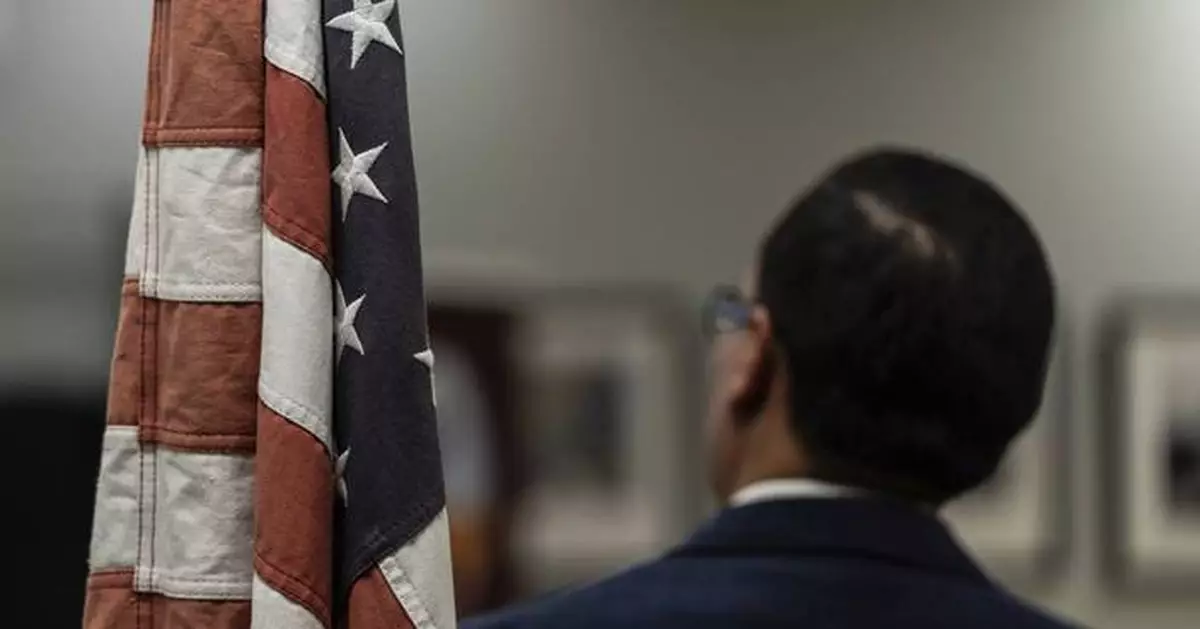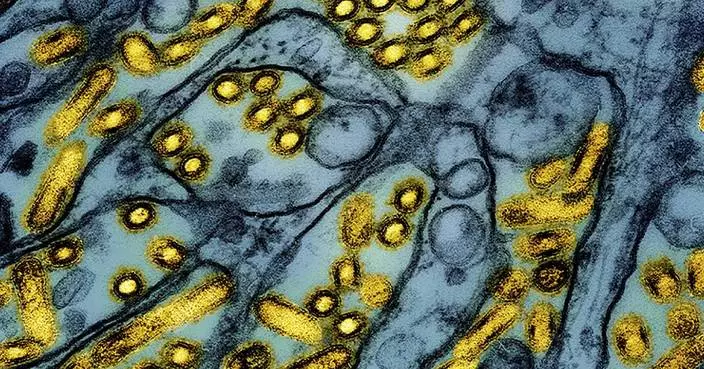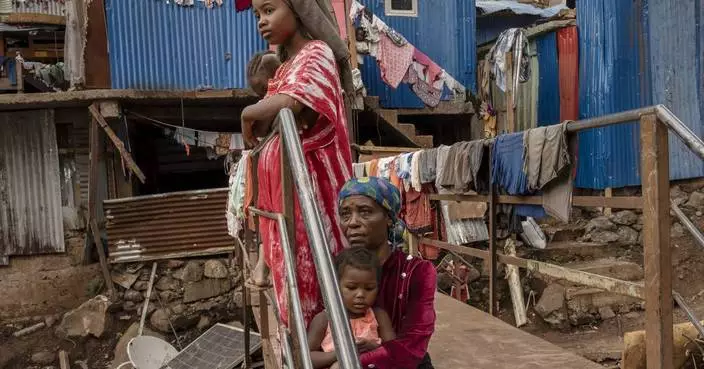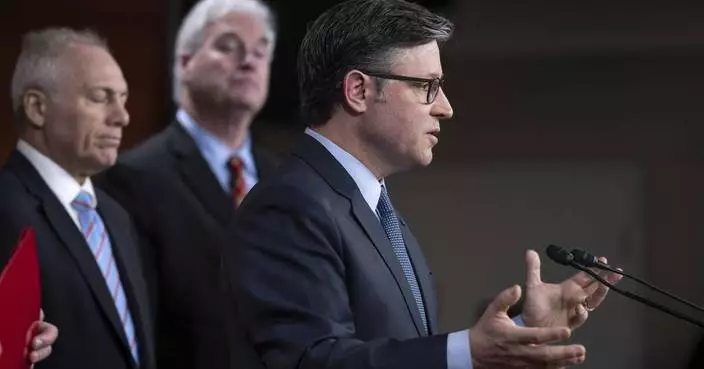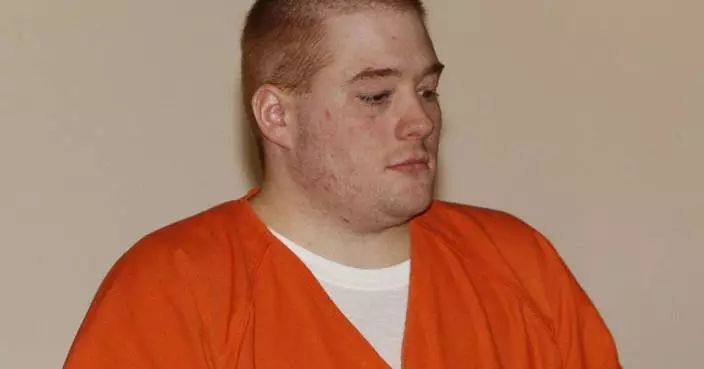LOS ANGELES (AP) — Winston Leiva rattles off a long list of things immigrants should do to protect themselves against President-elect Donald Trump's promise to conduct mass deportations when he returns to the White House.
Make a plan for someone to care for your children if you are arrested. Don't open the door unless authorities slip a signed judicial warrant under it. And above all, exercise your right to remain silent.
Click to Gallery
Elizabeth Rodriguez, digital content creator at the Coalition for Humane Immigrant Rights, sets up a banner for a bilingual workshop for immigrants who want to stay in the United States in Los Angeles, Wednesday, Dec. 4, 2024. (AP Photo/Jae C. Hong)
Winston Leiva, community education programs manager at the Coalition for Humane Immigrant Rights, is reflected in the glass of a photo as he gives a bilingual workshop for immigrants who want to stay in the United States, in Los Angeles, Wednesday, Dec. 4, 2024. (AP Photo/Jae C. Hong)
Winston Leiva, community education programs manager at the Coalition for Humane Immigrant Rights, gives a bilingual workshop for immigrants seeking to prepare to stay in the United States at the organization's office in Los Angeles, Wednesday, Dec. 4, 2024. (AP Photo/Jae C. Hong)
A participant holds a "rights card" during a bilingual workshop for immigrants who want to stay in the United States at the office of the Coalition for Humane Immigrant Rights organization in Los Angeles, Wednesday, Dec. 4, 2024. (AP Photo/Jae C. Hong)
Winston Leiva, community education programs manager at the Coalition for Humane Immigrant Rights, stands next to a U.S. flag while giving a bilingual workshop for immigrants who want to stay in the United States, in Los Angeles, Wednesday, Dec. 4, 2024. (AP Photo/Jae C. Hong)
“We already know this administration,” Leiva told participants of a bilingual workshop in Los Angeles for immigrants who want to stay in the United States. “The truth is we don’t know to what extent it will affect us."
The Coalition for Humane Immigrant Rights meeting, in a conference room decorated with a colorful mural of civil rights icons and a large American flag, is one of many taking place nationwide as immigrant advocates steel themselves for Trump’s second term. It’s déjà vu for those who sprung to action during Trump's first four years, when he changed the nation’s immigration system arguably more than any other U.S. president.
Advocacy groups from Utah to Massachusetts have hosted know-your-rights trainings to teach immigrants how to protect themselves, their friends and families from Trump’s promise to start deportations on his first day back in office. The efforts are underway in immigrant-friendly states including California and Illinois — which both enacted protections for immigrants in response to Trump's focus on enforcement during his first administration — and those with more stringent laws affecting immigrants such as Florida.
Connecticut Students for a Dream, an advocacy group for undocumented youth, recently held a session in the city of Danbury, which is home to immigrants from Ecuador, the Dominican Republic and elsewhere. Organizers advised that you don't have to speak with immigration agents if they knock on your door, and warned in a Facebook post: “If you choose to speak, remember not to lie.”
Advocates are also urging those who are eligible to complete applications for U.S. citizenship or other immigration benefits before next year, aiming to avoid potentially lengthy wait times under an incoming administration that seems focused on immigration enforcement rather than integration.
The Florida Immigrant Coalition is offering free clinics to help thousands of immigrants who may have a pathway to a legal status and can't afford a lawyer. Inside an already busy immigration court in Chicago, National Immigrant Justice Center attorneys who help run a legal help desk said they are trying to resolve as many cases as possible before Trump takes office.
“It feels a little different because we have a clear expectation of what is coming,” said Lisa Koop, the Center's national director of legal services. “It is demoralizing that the electorate lived through what happened last time and decided to go back to it.”
The Trump campaign has said the president-elect will start the largest deportation program in U.S. history during his second administration, but questions remain about how he will find and detain people.
Fear is widespread in immigrant communities. Advocates say they're fielding calls from immigrants with and without legal status and even from naturalized U.S. citizens worried about how the administration could affect them and their families — especially the American-born children of parents who wind up deported. Advocates are urging families to draft legal papers in case this happens.
“We know that separation is an issue, and we want to make sure that families are prepared for who takes care of their children, who takes care of their property,” said Renata Bozzetto, deputy director at the Florida Immigrant Coalition.
In New Haven, Connecticut, immigrant advocates have been holding sessions in high schools.
“That’s because they’ve reached out to us to request it,” said Rachel Doft, director of legal services for Integrated Refugee & Immigrant Services. “A lot of kids have questions, and especially kids in mixed-status families. They’re really afraid of (Trump’s deportation plan) and want to understand their rights.”
In Chicago, immigration attorney Fiona McEntee said advocates learned a lot during Trump's prior administration, including better ways to organize. She was among hundreds of lawyers who provided free legal services to immigrants at O’Hare International Airport in January 2017, after Trump temporarily banned refugees and citizens from seven Muslim-majority countries from entering the U.S.
“As much as we didn’t want to be here again, we’re more experienced,” McEntee said. “We are different immigration lawyers than we were eight years ago.”
In Los Angeles, Julie Gomez, 50, sat and listened attentively to the Coalition for Humane Immigrant Rights workshop, filming key snippets on her cellphone. She came with an Armenian community member who needs help, and Gomez wants to learn and prepare so she can spread the word to others in her Guatemalan community. While she said she doesn’t have reason to worry about Trump's immigration proposals, she knows many people who do.
“They’re obviously worried because they could be deported and what would happen to their children?” Gomez said. “Confused, and worried.”
Leiva, who manages community education programs at CHIRLA, spent more than an hour spelling out what immigrants should and shouldn't do if contacted by federal authorities. He said they should put all their important documents in one place and save money in case they need a lawyer. And if they are detained by authorities, Leiva said they should provide their name and birthdate — but nothing more — so relatives can look them up in an immigration detention database.
“Do not make their job easy,” Leiva told the group. “They have a job. You have a right.”
Tareen reported from Chicago. Associated Press writers Gisela Salomon in Miami and Susan Haigh in Hartford, Connecticut, contributed.
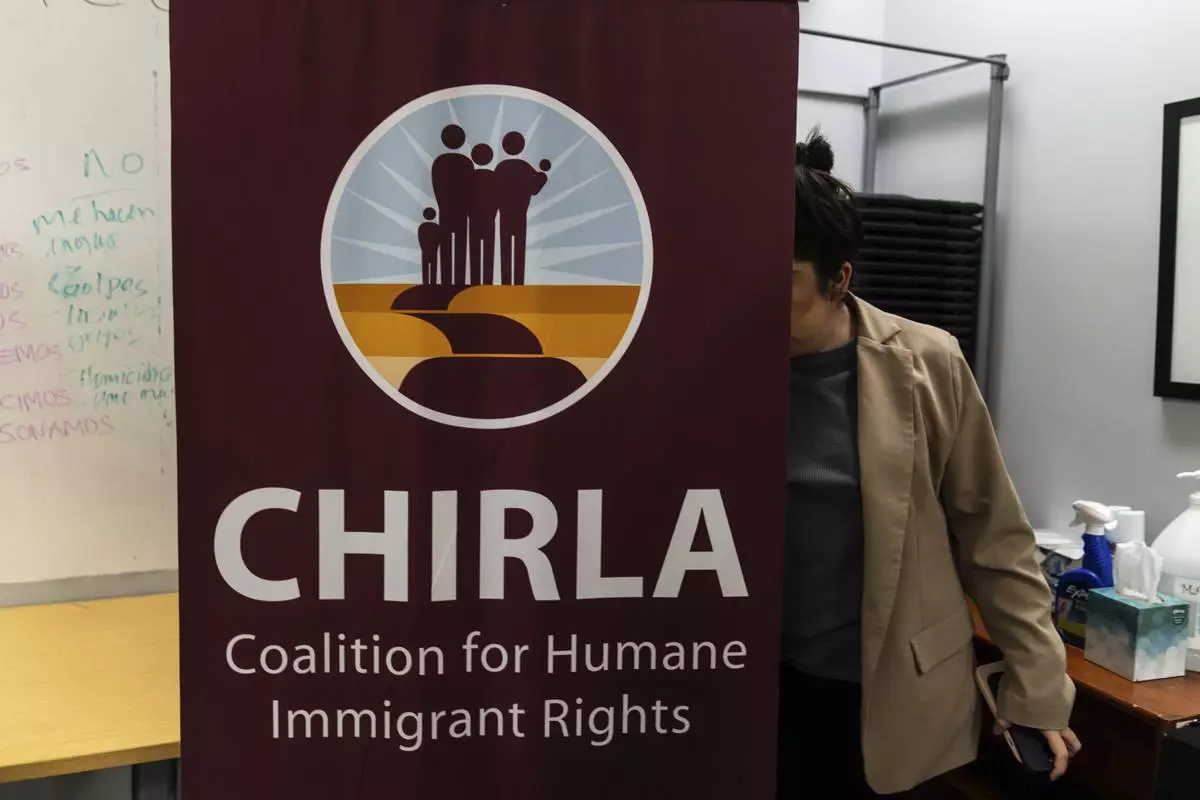
Elizabeth Rodriguez, digital content creator at the Coalition for Humane Immigrant Rights, sets up a banner for a bilingual workshop for immigrants who want to stay in the United States in Los Angeles, Wednesday, Dec. 4, 2024. (AP Photo/Jae C. Hong)
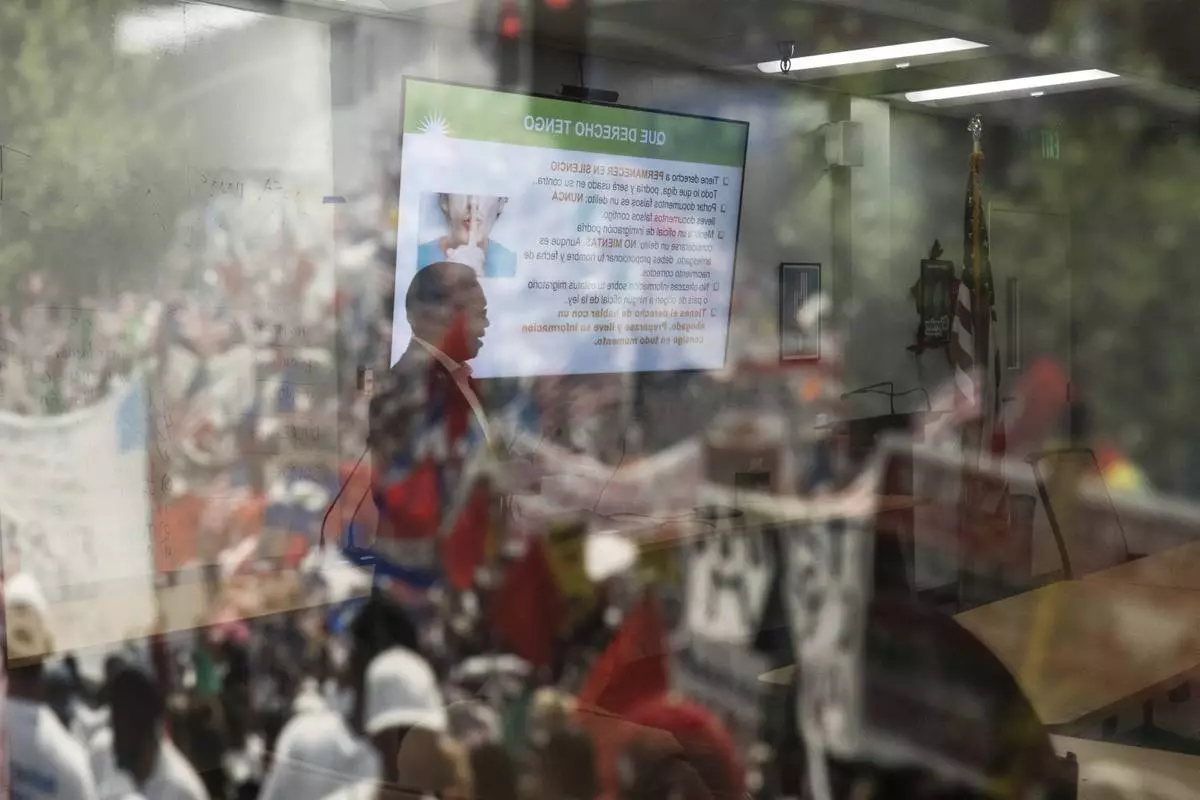
Winston Leiva, community education programs manager at the Coalition for Humane Immigrant Rights, is reflected in the glass of a photo as he gives a bilingual workshop for immigrants who want to stay in the United States, in Los Angeles, Wednesday, Dec. 4, 2024. (AP Photo/Jae C. Hong)
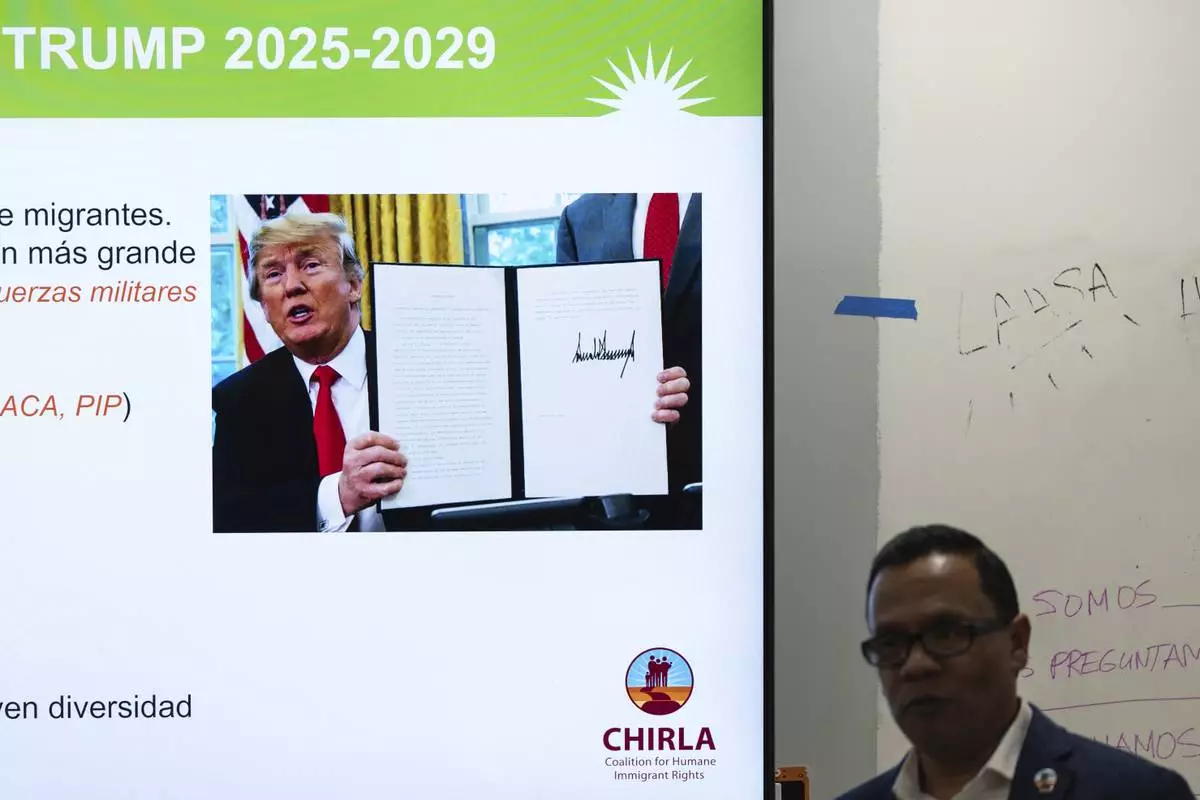
Winston Leiva, community education programs manager at the Coalition for Humane Immigrant Rights, gives a bilingual workshop for immigrants seeking to prepare to stay in the United States at the organization's office in Los Angeles, Wednesday, Dec. 4, 2024. (AP Photo/Jae C. Hong)
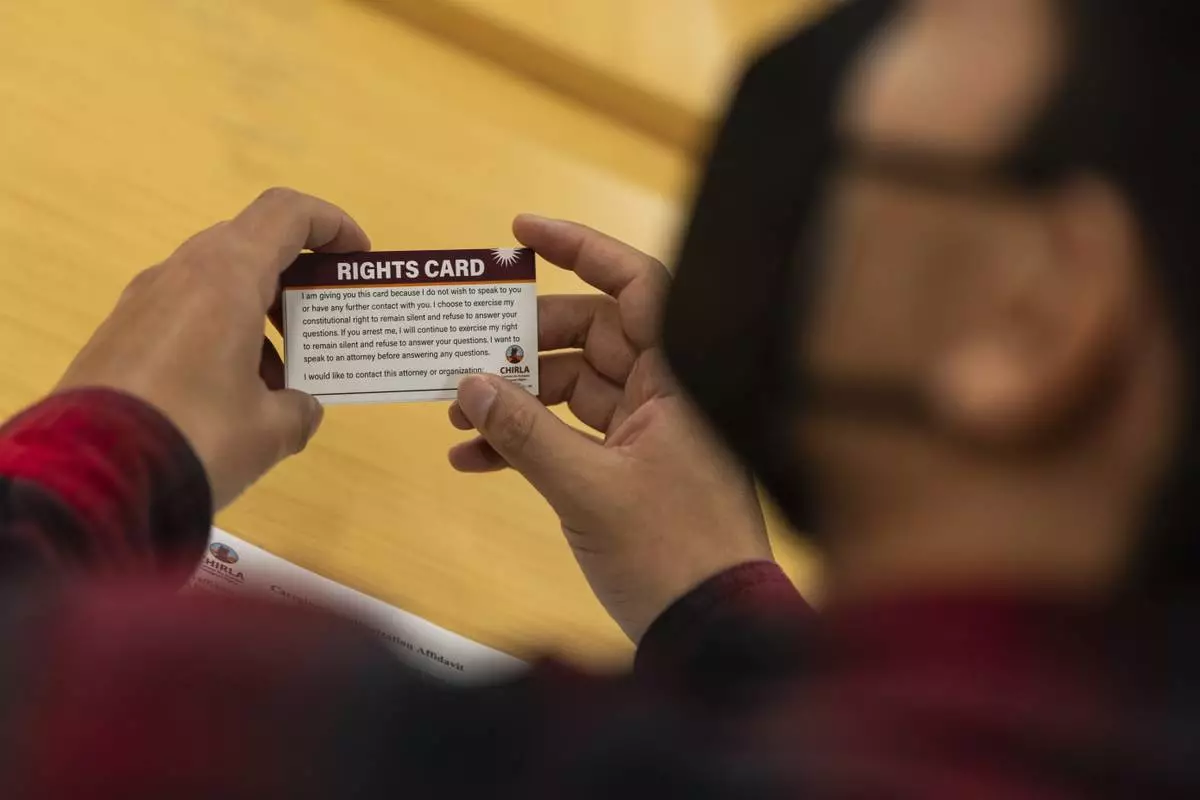
A participant holds a "rights card" during a bilingual workshop for immigrants who want to stay in the United States at the office of the Coalition for Humane Immigrant Rights organization in Los Angeles, Wednesday, Dec. 4, 2024. (AP Photo/Jae C. Hong)
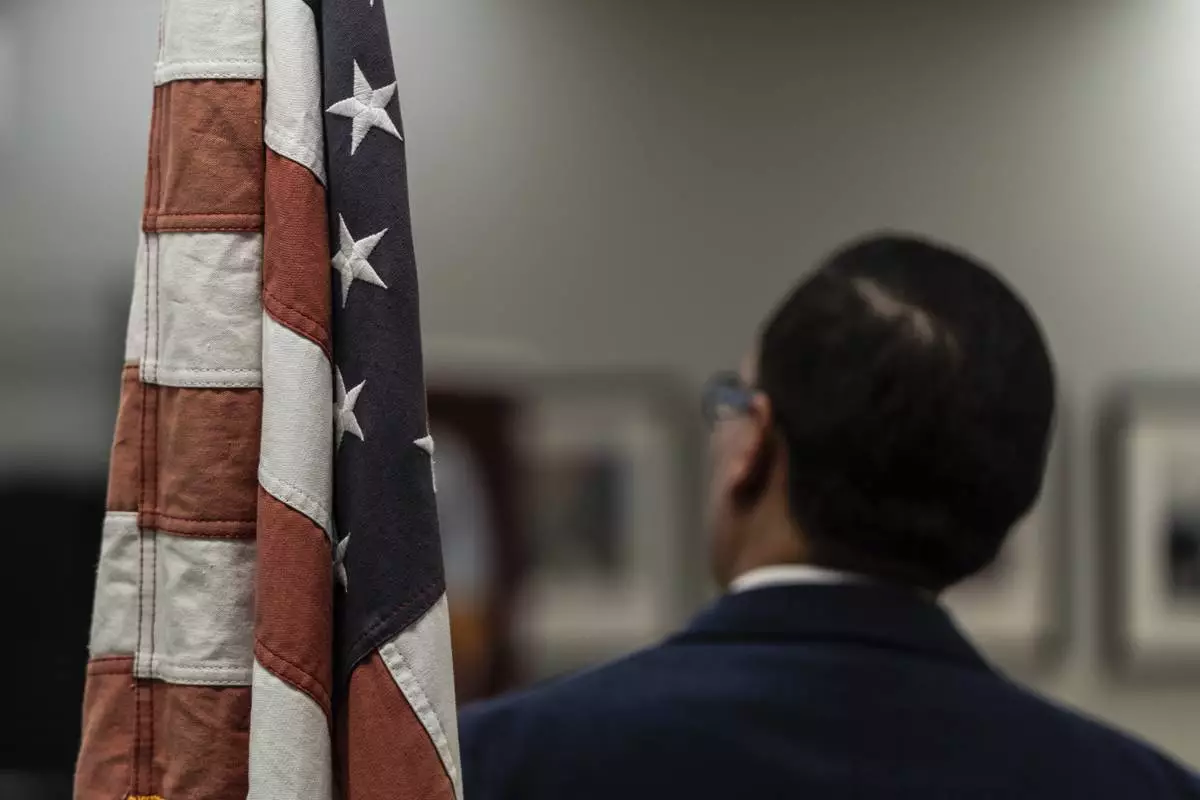
Winston Leiva, community education programs manager at the Coalition for Humane Immigrant Rights, stands next to a U.S. flag while giving a bilingual workshop for immigrants who want to stay in the United States, in Los Angeles, Wednesday, Dec. 4, 2024. (AP Photo/Jae C. Hong)
UNITED NATIONS (AP) — Antony Blinken pointed to the promise and pitfalls of artificial intelligence in a likely final trip to the United Nations as secretary of state, capping his engagements with the world body after a tumultuous four years that saw war return to Europe and multiple crises in the Middle East.
With the U.N. Security Council more divided than ever, Blinken is leading two meetings of the U.N.’s most powerful body on Thursday. But neither will focus on Russia’s war with Ukraine or the Middle East, where the U.S. has been frequently at odds with permanent members China and Russia and almost always in the minority when it comes to Israel’s war against Hamas in Gaza.
Instead, in an apparent bid to produce a modicum of consensus, Blinken is leading Security Council sessions on AI and the conflict in Sudan, which aid agencies say has sparked a dire humanitarian crisis that has not received enough attention.
On AI, Blinken said it has the potential to do “tremendous good” but can also pose “tremendous threats to the international peace and security that this council is charged with upholding.”
Here’s a look at America's top diplomat at the U.N.:
Blinken has been appearing in person and virtually before the Security Council since March 2021, just after assuming his position as the Biden administration’s top diplomat.
In addition to several one-off council meetings, including one in February 2022 shortly before Russia invaded Ukraine, Blinken has gone to New York for a week every September for the annual General Assembly gathering of world leaders.
The presidency of the Security Council rotates alphabetically every month among its 15 members. This month, it's the U.S. turn.
The country holding the presidency almost always organizes several signature events on topics its government chooses. Presidents, prime ministers and foreign ministers often preside at these meetings, which ministers from other council nations are invited to attend.
Russia and China have blocked all council action condemning the invasion of Ukraine.
This has led U.S. officials to believe that a session on the topic, especially as President-elect Donald Trump prepares to take office with a stated goal of ending the war immediately, would likely be a waste of time.
On the Middle East, the U.S. has frequently vetoed council action condemning Israel for its tactics against Hamas in Gaza, leaving it virtually alone at the United Nations in supporting Israel.
The U.S. leads the world in developing AI technology, according to a recently released Stanford University index, and it has been in the forefront of U.N. action on AI.
In March, the first U.N. resolution on artificial intelligence was adopted by the 193-member General Assembly. Sponsored by the U.S., it gives global support to an international effort to ensure the powerful technology benefits all nations, respects human rights and is “safe, secure and trustworthy.”
Blinken noted some threats posed by AI, saying “repressive regimes are using AI-enabled surveillance to target journalists and political dissidents" and that "if algorithms are built into weapon systems, and if they malfunction, they could spark a conflict.”
“By setting rules of the road for AI we can minimize these risks, we can harness the exceptional promise of this technology,” he said.
The U.S. ambassador to the U.N., Linda Thomas-Greenfield, recalled in early December that the previous U.S. presidency of the Security Council in August 2023 took place just months after war broke out in Sudan between rival generals heading the military and paramilitary forces.
The fighting has left tens of thousands dead, forced millions from their homes and pushed a large swath of Sudan’s population to starvation — creating an often forgotten global crisis the U.S. is seeking to spotlight.
Sudan “is facing one of the most dire humanitarian crises on the face of the planet,” State Department spokesman Vedant Patel told reporters Wednesday.
“And so anything we can do to continue to work with partners at the U.N. and otherwise to shed light on that, figure out what ways we can continue to unearth and solidify humanitarian corridors and continue to push for a political solution, that’s absolutely a priority for us and we will continue to use ways to elevate that,” he said.
Blinken has represented the U.S. at the Security Council about half a dozen times at meetings ranging from Russia’s invasion of Ukraine to the war in Gaza.
Russia, like the U.S. and China, is a permanent veto-holding member of the 15-nation council, and both have seats at its horseshoe-shaped table.
But apart from pointed disagreements during debates, there have been no confrontations or one-on-one meetings between Blinken and Russian diplomats at previous U.N. meetings — and there was none on Thursday.
Blinken thanked Russian Ambassador Vassily Nebenzia after his remarks — as is custom — even though Nebenzia accused the U.S. of imposing rules on others but not abiding by them. But the Russian envoy agreed that “we cannot allow AI to dominate human beings and human values.”
It is not unusual for Blinken or other senior U.S. officials to attend international meetings and conferences where Russian officials are present, but interactions are rare.
Lee reported from Washington.
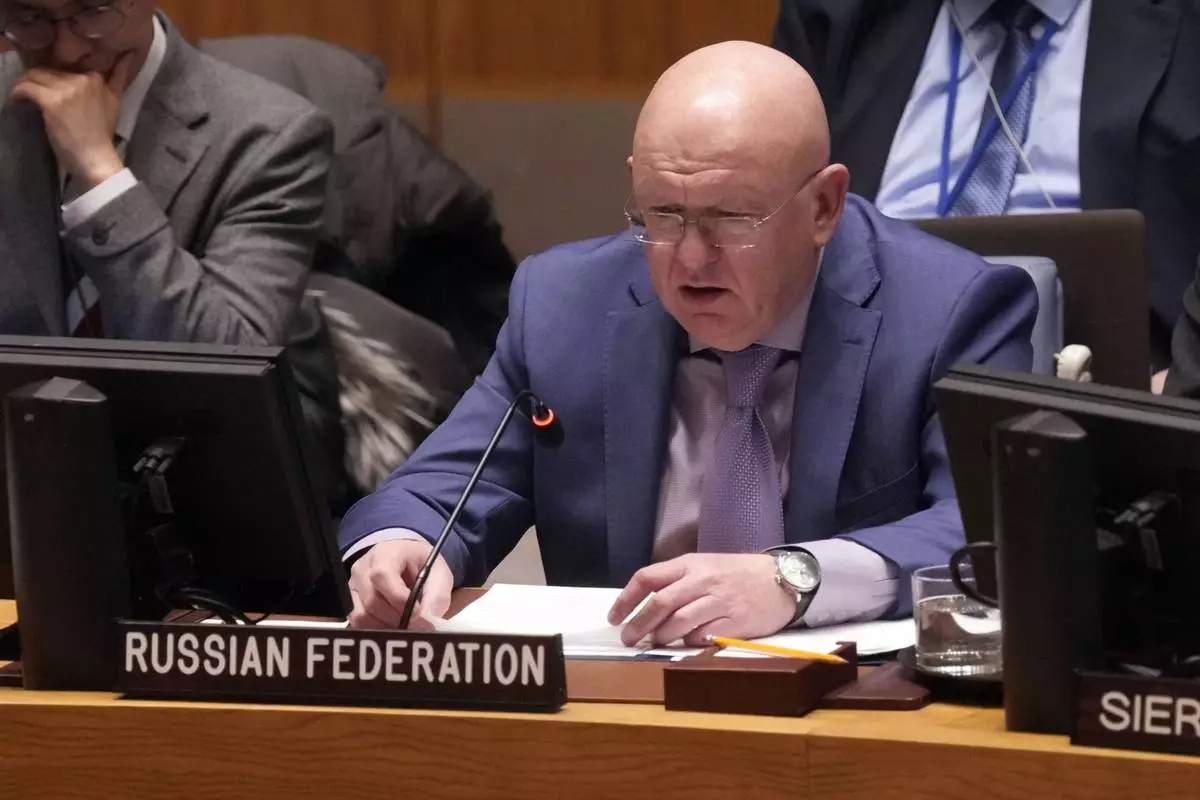
Russia UN Ambassador Vasily Nebenzya addresses the United Nations Security Council, Thursday, Dec. 19, 2024. (AP Photo/Richard Drew)
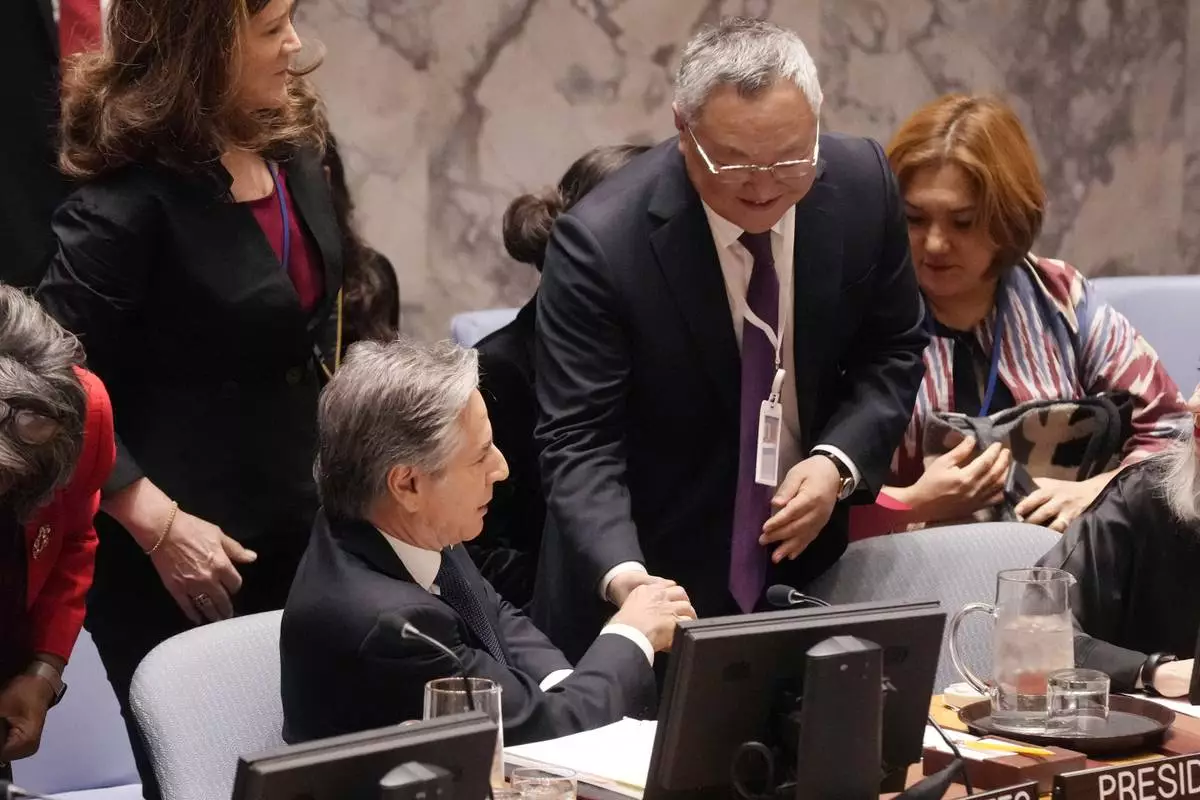
U.S. Secretary of State Antony Blinken is greeted by China's UN Ambassador Fu Cong, right, in the United Nations Security Council, Thursday, Dec. 19, 2024. (AP Photo/Richard Drew)
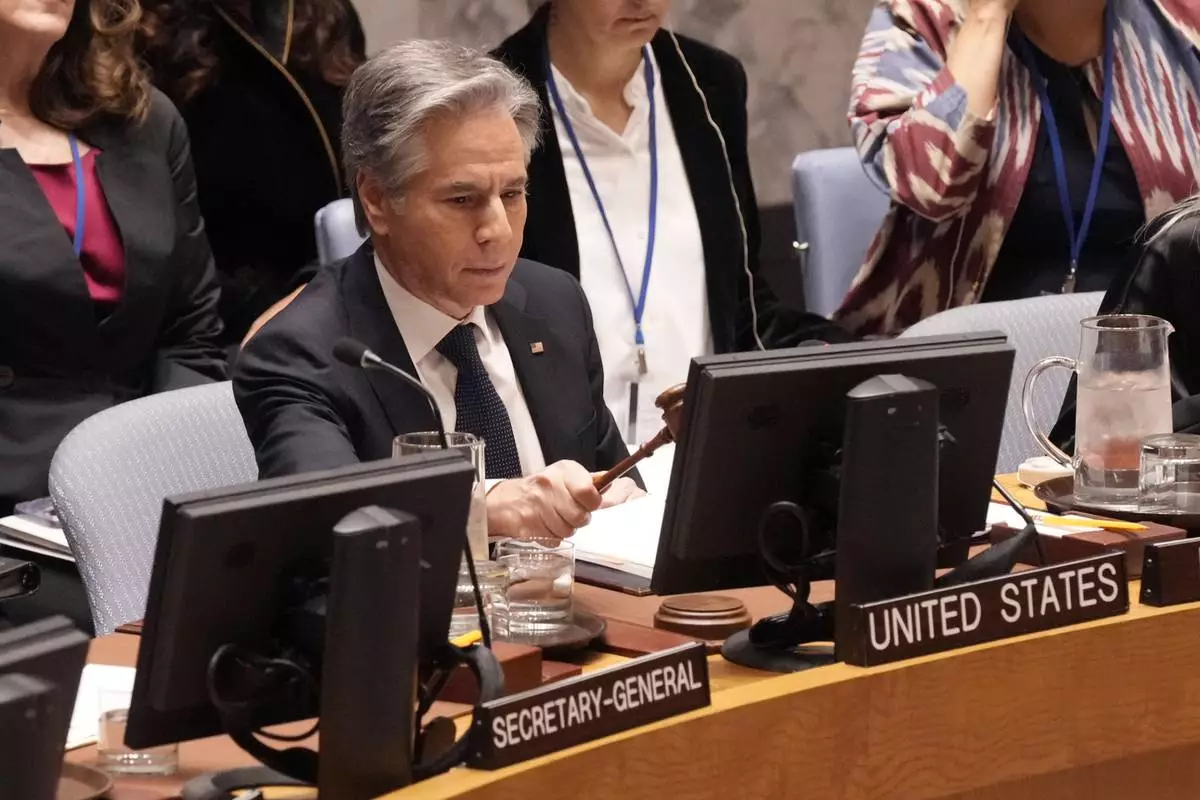
U.S. Secretary of State Antony Blinken gavels the meeting open as President of the United Nations Security Council, Thursday, Dec. 19, 2024. (AP Photo/Richard Drew)
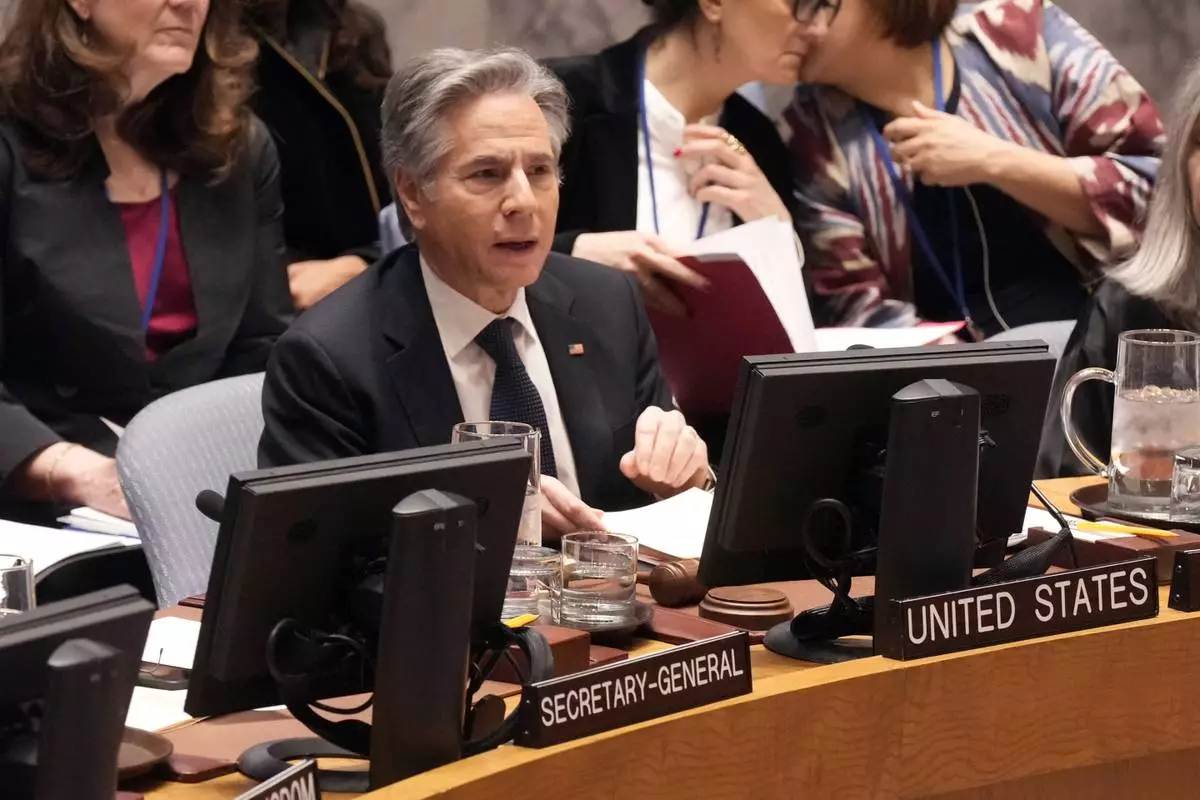
U.S. Secretary of State Antony Blinken addresses the United Nations Security Council, Thursday, Dec. 19, 2024. (AP Photo/Richard Drew)
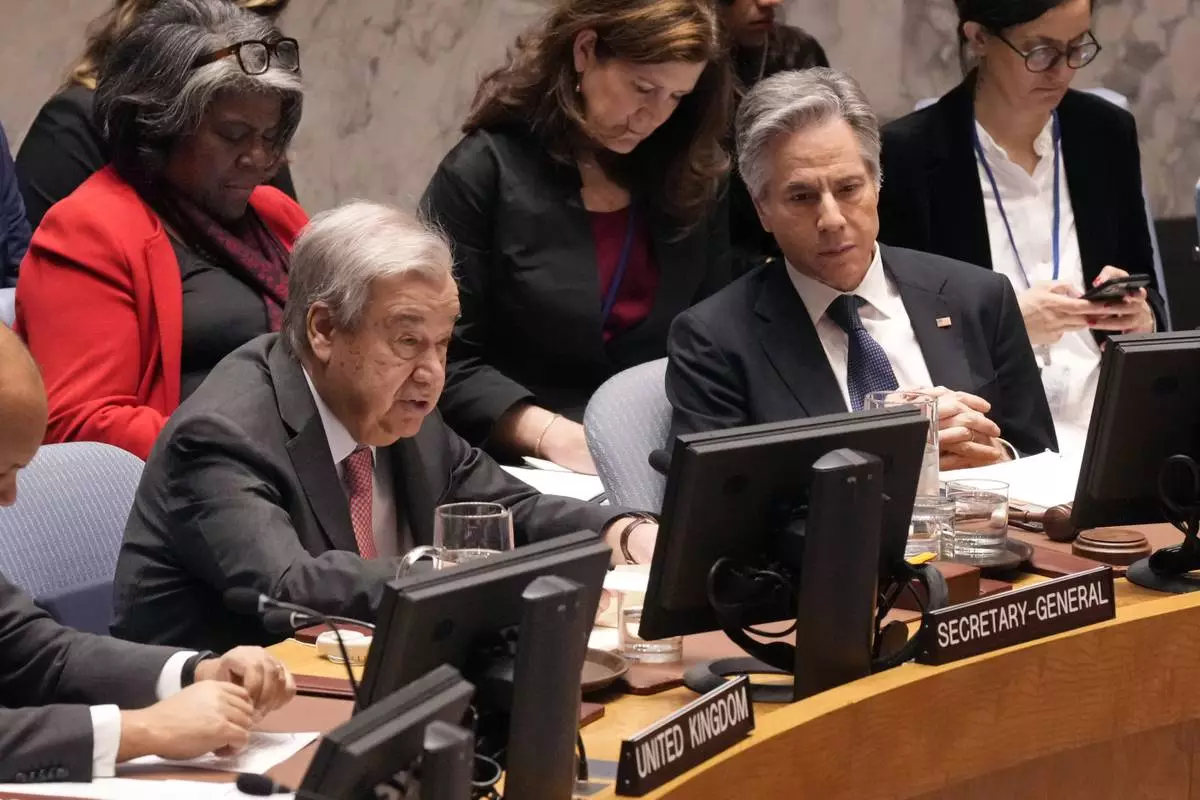
U.S. Secretary of State Antony Blinken, right, listens as UN Secretary General Antonio Guterres, left, delivers his remarks in the United Nations Security Council, Thursday, Dec. 19, 2024. US Ambassador Linda Thomas-Greenfield is seated, upper left. (AP Photo/Richard Drew)
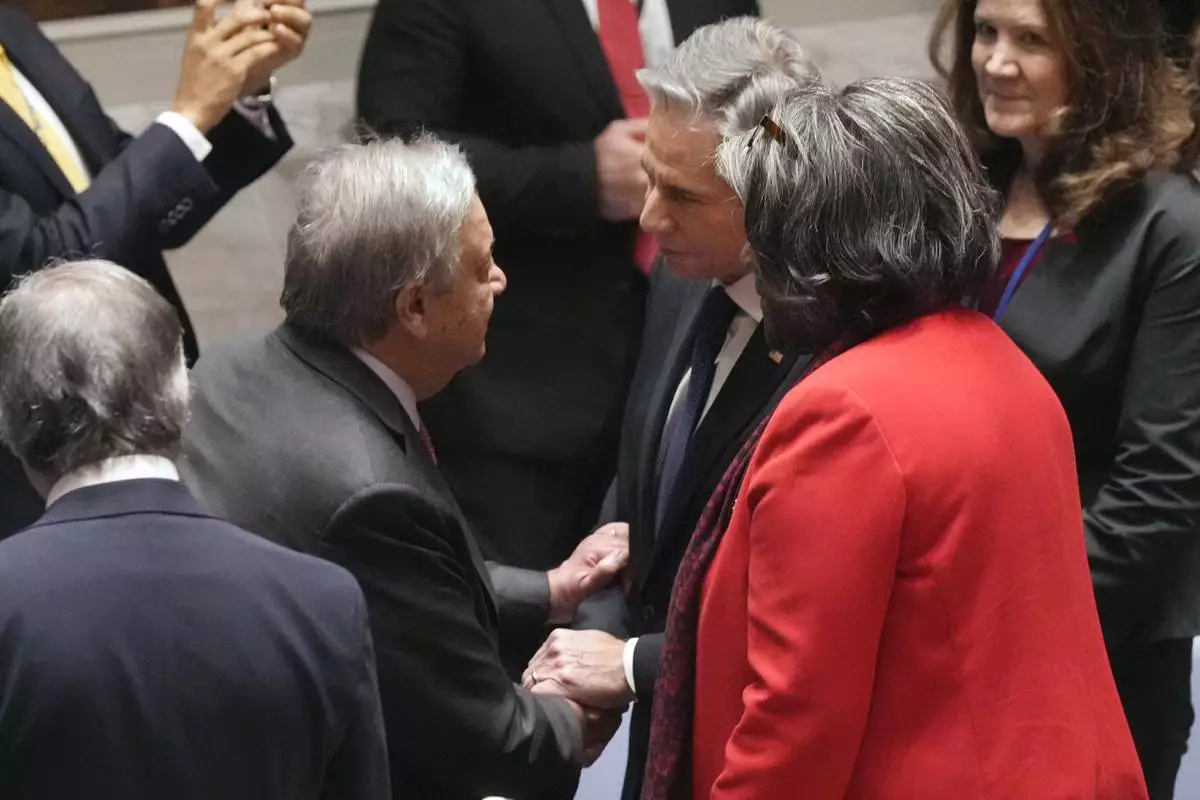
U.S. Secretary of State Antony Blinken, center, talks with UN Secretary General Antonio Guterres, left, and US Ambassador Linda Thomas-Greenfield, right, in the United Nations Security Council, Thursday, Dec. 19, 2024. (AP Photo/Richard Drew)
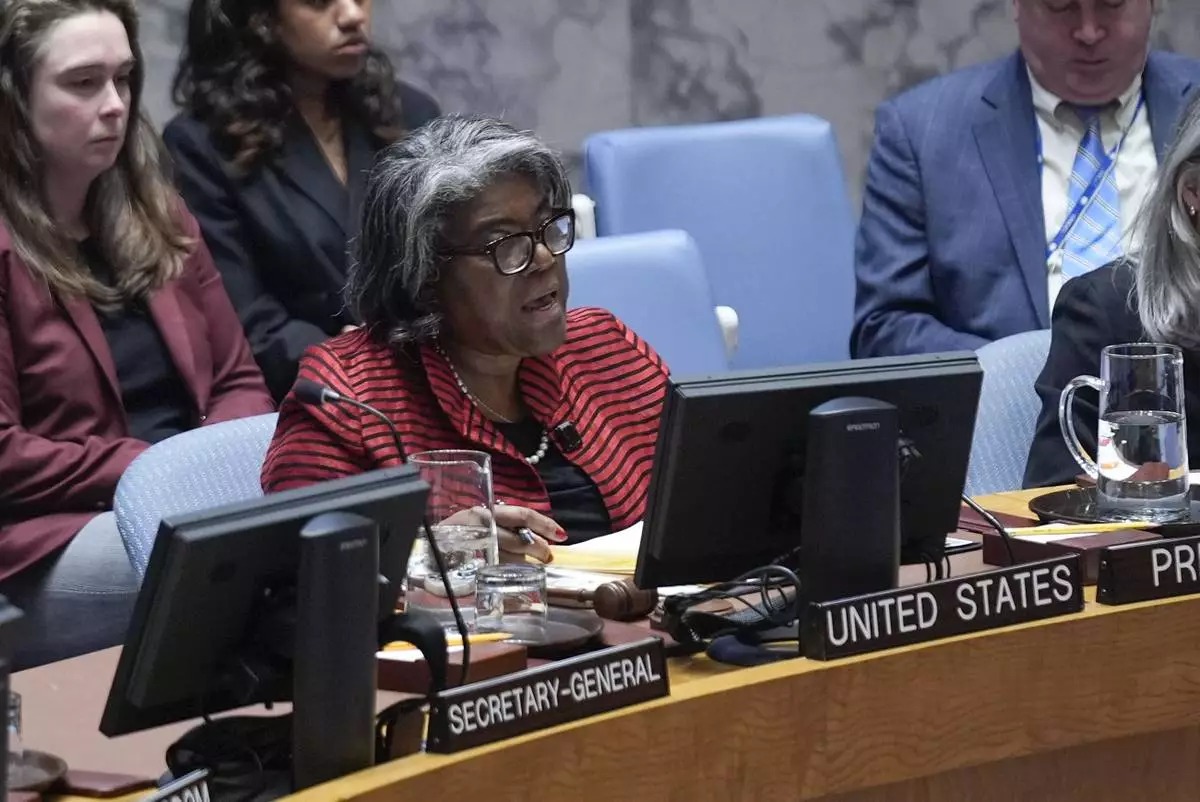
Linda Thomas-Greenfield, United States Ambassador to the United Nations, speaks during a Security Council meeting at United Nations headquarters, Wednesday, Dec. 18, 2024. (AP Photo/Seth Wenig)
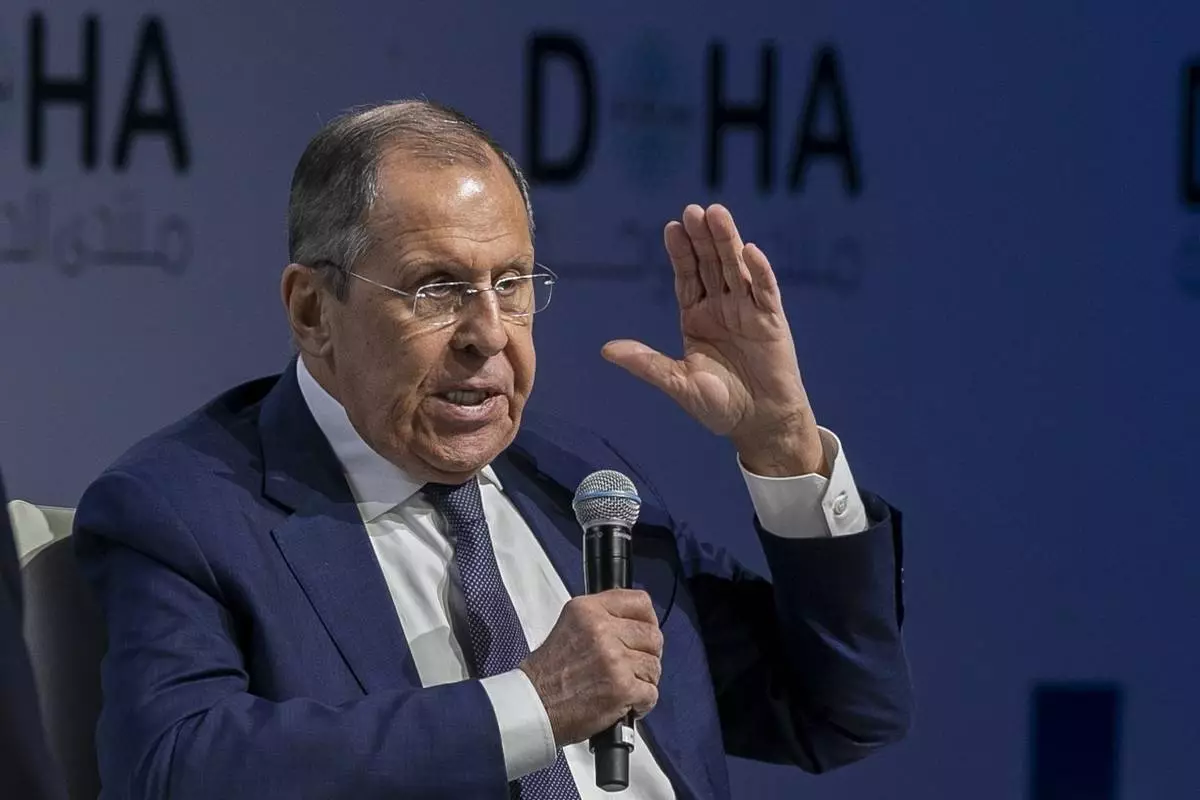
Russian Foreign Minister Sergey Lavrov gestures as he speaks at the Doha Forum in Doha, Qatar, on Saturday Dec. 7, 2024. (AP Photo/Hussein Sayed)
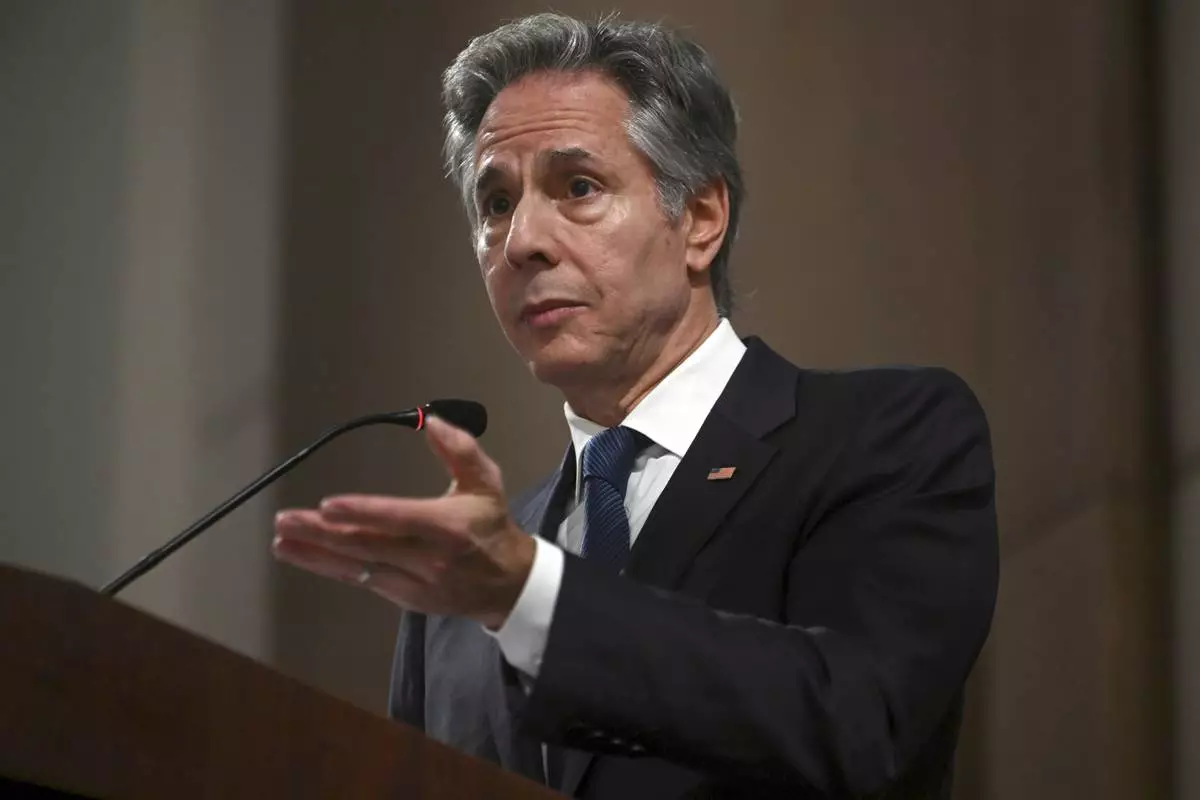
FILE - Secretary of State Antony Blinken speaks after meeting with the foreign ministers of the Arab Contact Group on Syria in Jordan's southern Red Sea coastal city of Aqaba, Dec. 14, 2024. (Andrew Caballero-Reynolds/Pool via AP, File)







